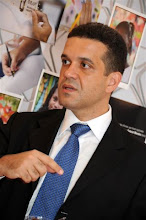- Back to Home »
- Embrapa gains agility abroad
Posted by : Fabiano Gallindo
Tuesday, March 15, 2011
The Brazilian Agricultural Research Corporation (Embrapa) should have agility for operation abroad after publication of a law this month. Law 12,383, of March 2, allows the institution to operate outside the country, as the former legislation only forecasted operation in the country. To be able to operate abroad, therefore, up to now the company operated through partnerships with international organisations.
According to information disclosed by the Technical Coordinator at Embrapa, Antonio Prado, the law should make it easier for Embrapa to manage resources abroad, like, for example, expenses with personnel aboard. It will also allow the company to have accounts abroad, to open its own offices and to receive royalties abroad, for research and products, outside the country. In practice, the organisation will be able to manage the operational, financial and administrative part abroad, without having to do so through partners.
Currently, Embrapa operates on two fronts in the international market: in projects for technology transfer developed in Ghana, Panama, Venezuela, Senegal, Mali and Mozambique, and in scientific cooperation, which it has in the United States, Europe and South Korea. In both cases, however, the company operates through partners, like governments or enterprises in the countries. The offices, when they exist, are loaned, or the employees work at the structure of the international partner, as is the case in scientific cooperation.
According to Prado, despite publication of the law, Embrapa does not plan to modify its method of operation abroad. Despite autonomy to have accounts abroad, for example, the company should study each case to see what is more viable. The opening of research centres is discarded by Prado. "It is not good business," he said. What is more viable, according to Prado, is the model of scientific cooperation, called virtual laboratories, in which Embrapa employees work at the partner centres, in state of the art research.
The technology transfer projects that Embrapa has in Africa, in turn, are through international partnerships, with the help the Brazilian Cooperation Agency (ABC), at the request of the ABC and the Brazilian Foreign Office (Itamaraty). In the case of Ghana, the office and its structure are granted by the local government. In the case of these technical cooperation projects, like the one in Ghana, Embrapa only covers the cost of its own employees. The maintenance aid that comes from the ABC and the remaining costs, like tickets and purchase of equipment, are the responsibility of the agency and of the local partner.
According to Prado, in the area of technology transfer, the participation of Embrapa personnel in specific projects has shown itself more interesting, as is the case in Mali (where the project is headquartered, despite covering Burkina Faso, Benin and Chad), in which participation occurs specifically in a project in a cotton area, and in Senegal, where it is focussed on a rice crop, or in Mozambique, where the focus is on agricultural innovation. Also under discussion are two new projects in these moulds, with Japan and the United States, also in Mozambique.












